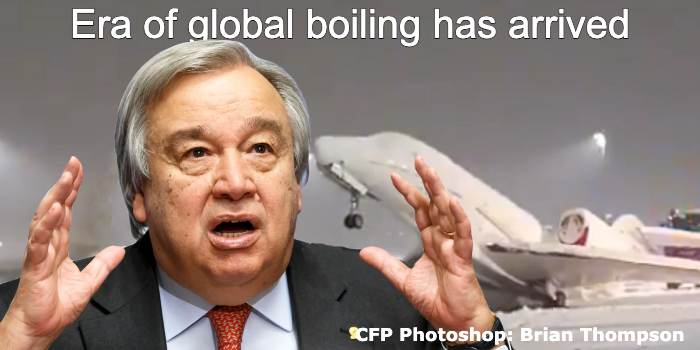By Jack Dini ——Bio and Archives--December 10, 2023
Global Warming-Energy-Environment | CFP Comments | Reader Friendly | Subscribe | Email Us

IPCC (Intergovernmental Panel on Climate Change) models rooted in assumption that we humans can and do control the Atlantic Ocean's circulation with our daily activity CO2 emissions have been wrong since the mid-1980s. Why should we still believe in them asks Kenneth Richard. (1)
The latest IPCC report continues to say it is 'very likely' the Atlantic Meridional Ocean Circulation (AMOC), a fundamental climate parameter, will weaken (and unleash cooling, catastrophic storms, drought, floods) in the 21st century.
But as the authors of a recent study note, since the mid-1980s the 84 Couple Model Intercomparison Project (CMIP5) and 56 (CMIP6) AMOC models have been contradicted by observations in both magnitude and sign. The AMOC has not been declining in response to increases in atmospheric CO2. There is even evidence of trend increases. (2)
So, as some scientists ask, why should we trust future model predictions?
One reader had this succinct comment: "Every prediction of environmental doom in the past century has been wrong, so it is obvious humans can not predict the climate in 50 or 100 years. Except me. The climate will get warmer unless it gets colder." Another asks: "How long have they been telling me that Miami will be under water within ten years? At least 30 years, perhaps closer to 40?" (1)
Another recent example: East Pacific has been cooling down more and more over the past 30 years and this is contrary to all predictions. (3)
This cooling of the East Pacific has defied the forecasts made by climate models, which predicted a warming due to greenhouse gas emissions.
The region of cooling is the ocean area that stretches west of Ecuador and could reduce greenhouse gas warming by 30 percent. The false prediction by climate models risks misleading the agriculture industry, as it is known that ocean temperatures impact growing conditions around the world.
The steady cooling also has global implications. The future of the cold region could determine, among other things, whether California is hit by a permanent drought or Australia faces increasingly severe wildfires. It affects the intensity of the monsoon season in India and the likelihood of droughts and famines in the Horn of Africa. It could even change the scale of climate change worldwide by altering the sensitivity of Earth's atmosphere to rising greenhouse gas emissions. The cooling of the East Pacific has defied the forecasts made by climate models, which predicted a warming due to greenhouse gas emissions. (3)
Models are pushing further and further into the domain of the terra incognita (unknown or unexplored territory). (4)
It is well established in climate science that water:
But there's a rather large problem here. When it comes to climate models, the unknown, unexplored 'terra incognita zone is what we experience today.'
Existing climate models cannot resolve the detailed structure and life cycles of systems such as tropical cyclones, depressions, and persistent high pressure systems, which are key in the coupling of the energy and water cycle.
Support Canada Free Press

While ocean circulation determines the regional climate, present day global models are also unable to resolve ocean currents that are fundamental to climate variability.
Claiming that we know it is humans controlling the climate today is thus a statement of belief. The claim has no scientific meaning or testability. Indeed, it is unfalsifiable. (4)
Living legend Princeton physicist Freeman Dyson has harsh critical words for climate scientists and models they rely on. He calls the science of climate modeling a 'very dangerous game.' He adds, 'You work with a computer model for years and years, improving the model, in the end you are believing it. It's very difficult to remain objective.'
On why we should not trust the models, Dyson says, 'because they're wrong.' He adds that although the models are very good tools for understanding climate, 'they are very bad at predicting climate, and that these scientists live by scaring the public.' (5)
View Comments
Jack Dini is author of Challenging Environmental Mythology. He has also written for American Council on Science and Health, Environment & Climate News, and Hawaii Reporter.